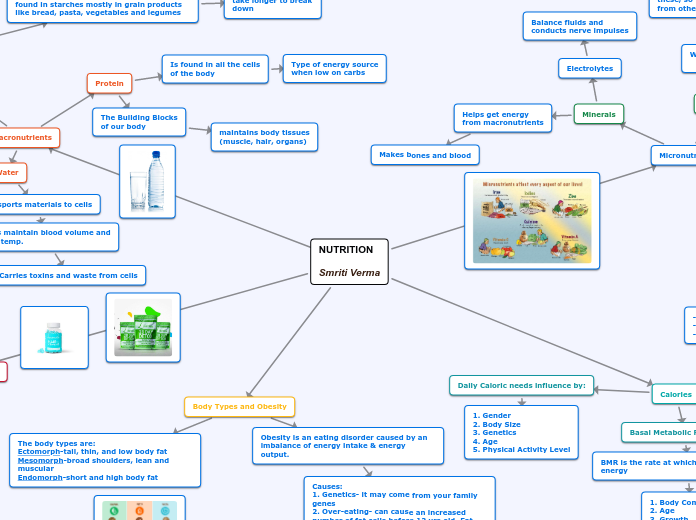NUTRITION
Smriti Verma
Micronutrients
Minerals
Helps get energy
from macronutrients
Makes bones and blood
Electrolytes
Balance fluids and
conducts nerve impulses
Vitamins
Chemicals the body uses to build energy
from foods
Builds and maintains cells
Water-Soluble
Vitamins
The body cannot store
these, so you eat them
from other foods. i.e vitamin C
Fat-Soluble
Vitamins
Gets absorbed by the
small intestine, then
stored in the liver. i.e
vitamin D
Trends and Theories
Theories
Diet
Atkins Diet:
This diet restricts carbohydrates, making the body burn its own fat for fuel, instead of carbohydrates. When the body is in this state, many people tend to feel less hungry, and as a result, lose weight.
Trends
Hair Vitamins
Slim tea
Waist Trainer
Calories
Calories are the measurement
of energy found in food
-1 gram of carbohydrates has 4 calories
-1 gram of fat has 9 calories
-1 gram of protein has 4 calories
Energy Equation Balance
Energy in= Energy out, weight is maintain/stays the same
Energy in is greater/energy out, weight is gained
Energy out is greater/energy in, weight is lost
Daily Caloric needs influence by:
1. Gender
2. Body Size
3. Genetics
4. Age
5. Physical Activity Level
Basal Metabolic Rate(BMR):
BMR is the rate at which our bodies use energy
1. Body Composition
2. Age
3. Growth
4. Height
5. Sleep
Body Types and Obesity
The body types are:
Ectomorph-tall, thin, and low body fat
Mesomorph-broad shoulders, lean and muscular
Endomorph-short and high body fat
Obesity is an eating disorder caused by an
imbalance of energy intake & energy output.
Causes:
1. Genetics- it may come from your family genes
2. Over-eating- can cause an increased number of fat cells before 12 yrs old. Fat cells can grow 150% their original size
3. Metabolism-obese people have a higher BMR.
Health Risks
1. Diabetes
2. Hypertension
3. Arteriosclerosis
4. Angina pectoris
5. Varicose disease
6. Kidney disease
Macronutrients
Carbohydrates
Simple
Type of sugars found
in milk, fruit and yogurt
Provides a quick
source of energy
Complex
found in starches mostly in grain products like bread, pasta, vegetables and legumes
starches create a more
steady source of energy
These types of carbs
take longer to break
down
Fibre
type of complex
carbohydrate
this cannot be digested
makes you feel
full which helps manage weight
prevents cancer and removes
cholestrol
Fat
concentrated
source of energy
Fat protects organs and
keeps the body healthy
regulates hormones
A high diet in fat leads to heart
disease, cancer and diabetes etc
Saturated Fats
Bad Fat
Usually solid at room temp.
increases chances of LDL and obesity
Unsaturated Fats
Usually liquid at room temp.
lowers LDL
Protein
Is found in all the cells
of the body
Type of energy source
when low on carbs
The Building Blocks
of our body
maintains body tissues
(muscle, hair, organs)
Water
transports materials to cells
Helps maintain blood volume and
body temp.
Carries toxins and waste from cells







